From the Faculty of Arts …Ain Shams University launches the initiative of women's role in the green transformation
Under the auspices of Prof. Dr. Mahmoud El-Meteini, President of Ain Shams University, Prof. Dr. Abdel Fattah Saud, Vice President for Education and Student Affairs, Prof. Dr. Mohamed Ayman Saleh, Vice President for Graduate Studies and Research, Prof. Dr. Ghada Farouk, Vice President for Community Service and Environmental Development, Prof. Dr. Hanan Kamel, Acting Dean of the Faculty, Dr. Hind Al-Hilali, Director of the Women's Support and Anti-Violence Unit, launched the Women's Role in the Green Transformation initiative from the Faculty of Arts, organized by the Women's Support and Anti-Violence Unit.
In the presence of Prof. Dr. Yassin Al-Shazly, Vice Dean of the Faculty of Law for Graduate Studies and Research, Prof. Dr. Hoda Helal, Director of the Green Transformation Unit, Prof. Dr. Khaled Hamdi, former Dean of the Faculty of Law, Prof. Dr. Ahmed Al-Awadi, Director of the Center of Excellence for Sustainability.
Prof. Dr. Ghada Farouk expressed her happiness to be present today at the Faculty of Arts discussing one of the most important issues that we seek to provide all the efforts that support it, which is the role of women in the face of climate change, as this problem is faced by the whole world. In some places, drought and floods negatively affect food, causing famines that directly threaten the most vulnerable groups, namely children and the elderly, who need extensive support from women, so all efforts are combined to support women in terms of education and training on measures and procedures that contribute to mitigating climate change.
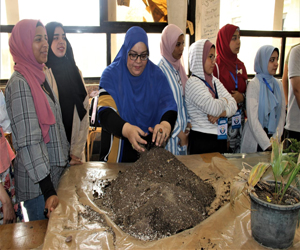 |
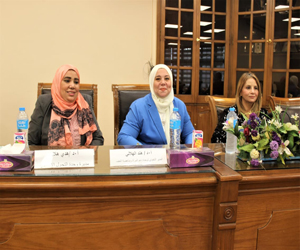 |
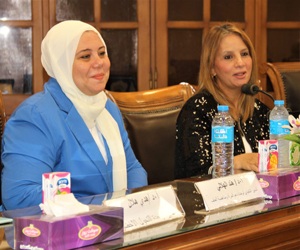 |
||
On her part, Prof. Dr. Hanan Kamel indicated the faculty’s role in spreading environmental awareness among students and practical participation as well by preparing workshops and training programs in the field of green transformation in conjunction with the preparation for the “COP 27” global climate conference scheduled to be held from 6-18 November in Sharm El-Sheikh and in line with the vision of Egypt and Sustainable Development 2030, as presented by Prof. Dr. Hanan Kamel thanks the unit for its efforts in supporting the societal participation of women at all levels.
As confirmed by Prof. Dr. Hind Al-Hilali, Director of the Center for Women's Support and Anti-Violence, urged the Faculty of Arts to embrace all the unit's initiatives and activities, hoping for the continuation of constructive cooperation in order to advance the university's role in serving the community.
She stressed the importance of the symposium in defining the goals of the World Climate Conference in the presence of representatives of the United Nations and 197 countries in order to discuss climate change and the measures taken by these countries to solve this problem and confront it as a fundamental turning point in international climate efforts.
Prof. Dr. Hind El-Hilali referred to the unit's efforts in sending reassuring messages to students and all university members by their presence in a calm environment.
It also reviewed the work mechanisms of the unit and the various activities it offers and accepts volunteers, and supports students to become entrepreneurs by supporting small projects.
As for environmental legislation, a. Dr.. Yassin Al-Shazly about the law as a tool of social control, and one of the most effective means in controlling societies along with raising awareness of the importance of preserving the environment from moral and religious motives.
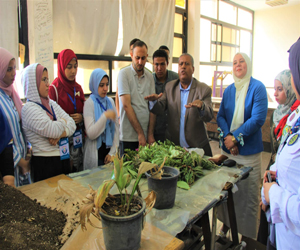 |
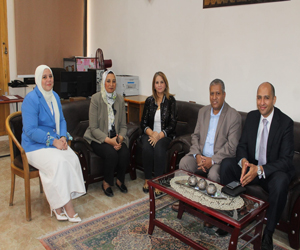 |
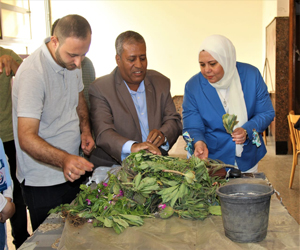 |
||
He also reviewed the laws and legislations related to the environment in Egypt, explaining that Egypt was one of the first countries that took the initiative to develop a unified environmental law, preceded by several legislations that started with Law 48 of 1982 to protect the Nile River, up to the 2014 constitution, which stipulated in Article 46 that the state, with its three authorities, take measures Necessary to preserve the environment, to ensure sustainable development.
He also pointed out that the law wanted to increase the penalty for violating the law with a misdemeanor, which is imprisonment from (24 hours to 3 years), in order to achieve public and private deterrence. Fund for the protection of the environment, and doubled environmental legislative awareness efforts.
He pointed to the economic transformation of green through the field of financial markets and stock exchanges, where the Financial Supervisory Authority initiated the issuance of green bonds that guarantee the purchase of environmentally friendly companies as a contribution to supporting the green economy.
In his intervention urged a. Dr.. Khaled Hamdi students to align themselves with the issue of the environment and to participate actively and positively in reducing environmental pollution by adopting the positive ideas offered by the university, as the university provides all measures to transform into a green university, and also urged those who do not commit environmental foolishness to educate their peers about the need to stop polluting their environment And respond by rationalizing energy and modifying behaviors in this context.
With regard to environmental sustainability, Prof. Dr. Ahmed Al-Awadi, Director of the Center of Excellence for Sustainability, stressed the need to preserve the natural, manufactured and social environment, now and in the future, to achieve the required sustainability and not to give precedence to one side over the other, as it is clear that the priority of material and economic interests has a negative impact on the social aspect of man, his safe living, his health, the ecological cycle and fertility in Sometimes, he referred to the forest fire in Brazil with the aim of finding a place to raise livestock and its negative impact on the size of the green area, and called for a return to green food as it is lower in heat emissions and carbon footprint.
Al-Awadi praised the “Climate Ambassadors” program launched by the university with the aim of educating different groups of adults and children about issues and topics related to climate change such as water, food, energy, biodiversity, afforestation, cleaner production methods, sources and types of energy, and mitigation and adaptation measures for dealing with climate change. He also praised the role of green bonds in granting incentives to companies that contribute to reducing heat emissions and carbon footprint.
a. Dr.. Huda Helal, Director of the Green Transformation Unit at the College of Graduate Studies and Environmental Research, reviewed the unit's efforts in supporting the dissemination of green thought and raising environmental cultural awareness, as well as modifying behaviors towards the environment so that the correct environmental behavior is the prevailing and common.
And she presented the university's experience of converting restaurant and cafeteria waste into organic fertilizer through transformational devices.
Suggestions were made to conduct a feasibility study for the project of recycling unused paper and hydroponics so that the student can apply it after graduation as a profit-oriented project.
Dr. Huda Helal explained the causes of heat emissions and the causes of the carbon footprint of humans, which is the first cause of increasing its area. Waste recycling, waste rationalization, behavior modification and rationalization of consumption.
It also called for a competition between colleges in the projects of rooftop cultivation and waste recycling, and the winning project will be rewarded with an appreciation and material prize.
On the sidelines of the launch of the initiative, a workshop was held at the Youth Welfare Department of the college for male and female students, where Dr. Hisham Abdel Latif, Chairman of the Board of Directors of the Youth Today Association for the Development of Civil Society
Head of the Rooftop Planting Project at the Cairo Agriculture Directorate, trained students to use plastic waste from water bottles as clay containers. They were trained in planting and collecting fallen leaves to fertilize clay.
Also, Dr. Amal Hassan Mohamed, a lecturer for the development of environmental knowledge and recycling, by training students on how to recycle paper waste.
At the end of the workshop, everyone was keen to take souvenir photos with the practical outcomes of the workshop.


.svg)




